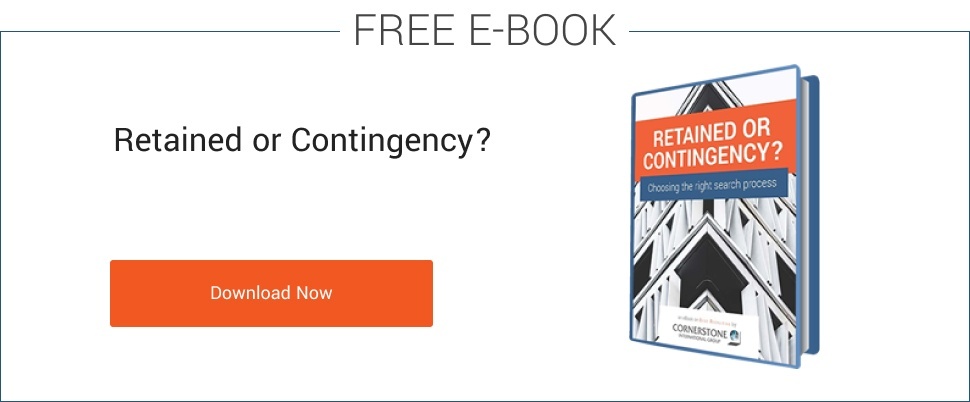Do You Need an Executive Search Firm?

“Depending on your talent needs, you’ll probably sleep better”
The law of cause and effect says there are no accidents. Everything happens as the result of a cause.
In the business of hiring executive talent, that means your success is directly dependent on the steps you take, the process you adopt. Luck is not an issue.
Advances in technology have created a stampede to do-it-yourself recruiting. The tools are brilliant, but their capabilities at this point are better suited for junior and mid-level searches.
It’s worth remembering this when you consider the other major development in recruiting. The cost of failure is going through the roof.
Only a few years ago, an accepted figure was 2.5x salary. Suppose you hire a senior manager at $200,000 a year and it doesn’t work out. You can expect to pay $500,000 to replace that person because you not only go through the costs of finding, testing, interviewing and hiring but also costs of separation, lost momentum, possibly lawsuits and outplacement fees.
But that was yesterday. Today’s leaders look at the total financial impact which, for a top performer is rated at 10 – 100X the person’s compensation. So that $200K game-changer has the potential for adding $2M to 20M to the firm’s performance each year.
With that in mind, you might want to take another look at best practices for recruiting and, if you recruit in-house, how far today’s technologies can take you.
The two basic options haven’t changed: Do it Yourself, or Hire the Pros
DIY
Technology – particularly SaaS – has enabled huge advances in talent search and acquisition, particularly regarding high volumes and the initial triage. SaaS, or software as a service, is delivered from the cloud, greatly simplifying adoption and facilitating in-house hiring.
The second great DIY enabler is social media, widely used by candidates and companies alike, which allows you to not only find but influence millions of potential hires.
So, is there still a need for the search firm?
The Executive Search Firm
Yesterday, it was thought the Internet and technology would kill the recruiting firms. On the contrary, the enabling of massive search has brought scale, but also brought out the limitations of machines when we get to decision time.
As the importance of the hire rises, so does the cost of failure (see total financial impact above). So, the high-end action still trends towards the specialist, retained search firm for its track record, accumulated wisdom and knowledge.
The search firm is using many of the same new tools to locate and qualify candidates more cost effectively, but you are accessing knowledge and tradecraft developed in many instances over decades.
Fact & Fantasy
In-house recruiting has changed significantly, but the specialist firm has moved on as well.
The “expensive” sticker has been mitigated. The set fee – usually around 30% of compensation – is still the norm, but many firms have become more aggressive with lower fees or fast service or enhanced performance warranties.
The fact there is a contract involved that can only be fulfilled through an approved selection or cancellation leads to extremely high levels of service and professionalism. And the concept of retained executive search encourages repeat business and a “partnership” approach to meeting challenges.
Here are some of the benefits of a fruitful relationship with a retained search firm, one which will build confidence in seeking those top performing, hard-to-engage hires. “Retained Search” is specified here, because this kind of collaboration is not generally available with a contingency search firm. Learn about the difference between Retained and Contingency Search..
Culture
This is the big one. Top achievers care more about the business environment than the compensation. The search firm will understand and promote your company culture. Just as important, it will verify that the candidates proposed can be expected to grow in your environment.
Confidentiality
This is important especially at the C-Suite and Board Director level. The search firm is in position to guard both the candidate’s identity and, provisionally, that of the client. This includes isolating any incumbent who may not be aware his or her position is subject of a search.
Sourcing
Bersin put out a Talent Acquisition Factbook a few years ago in which it estimated worldwide talent sourcing costs at $85 billion. Generally speaking, the market provides the only regulation over this vast amount of money. Some people may feel the retained search contract represents a measure of stability.
There’s also the issue of where to source from. If you go the DIY route, you will have to manage your own talent pool for future effectiveness. It is not for the faint of heart. In 2012, 18.4 million applicants found their jobs on Facebook.
Candidate Management
The enthusiasm of the candidate is heavily influenced by how he or she is treated during the process. Communications should be prompt and information forthcoming. They also need to feel they are wanted. Search firms are at home here. An in-house recruiter is more stressed by keeping multiple people aware of the processes and attitudes needed.
Compliance
This is one of the most important and easily overlooked issues. In virtually all jurisdictions, there are specific regulations regarding proper notification and screening as well as privacy. This will become even more difficult to manage in the 28 EU member countries starting in May 2018 with the implementation of the General Data Protection Regulation (GDPR).
The GDPR applies to the processing of personal data of all European residents and carries fines of up to 20 million Euros or 4% of global revenue. These are steep penalties and no-one seems too clear about first-year tolerance, or whether there will be any. The management consulting firm of Oliver Wyman predicts the EU could collect as much as $6 billion in fines and penalties the first year.
CALL US
The GDPR requirements are complex and ongoing, requiring constant management. They are the latest example – and a severe one — of risks to be faced in the search and engagement of high-end talent.
At Cornerstone International Group we’re familiar with these risks in 35 countries around the world.
Contact us (info@cornerstone-group.com) for more information, or browse www.cornerstone-group.com.



